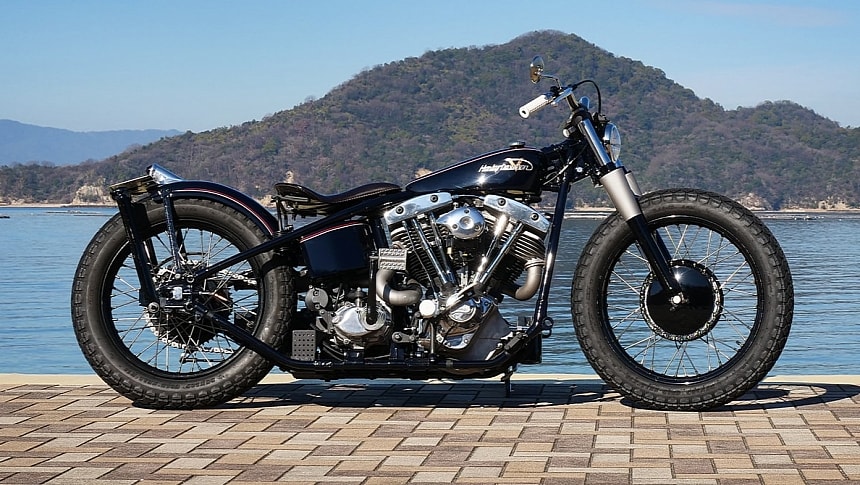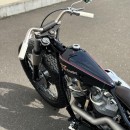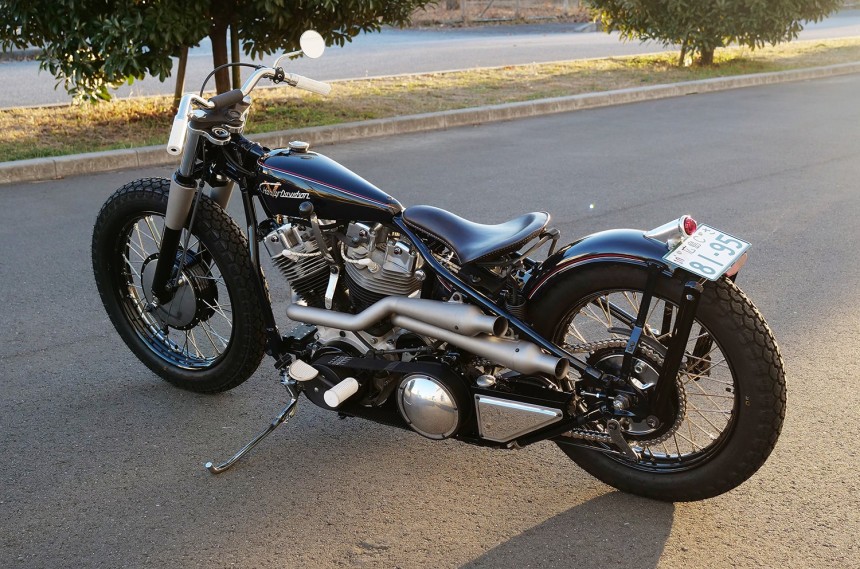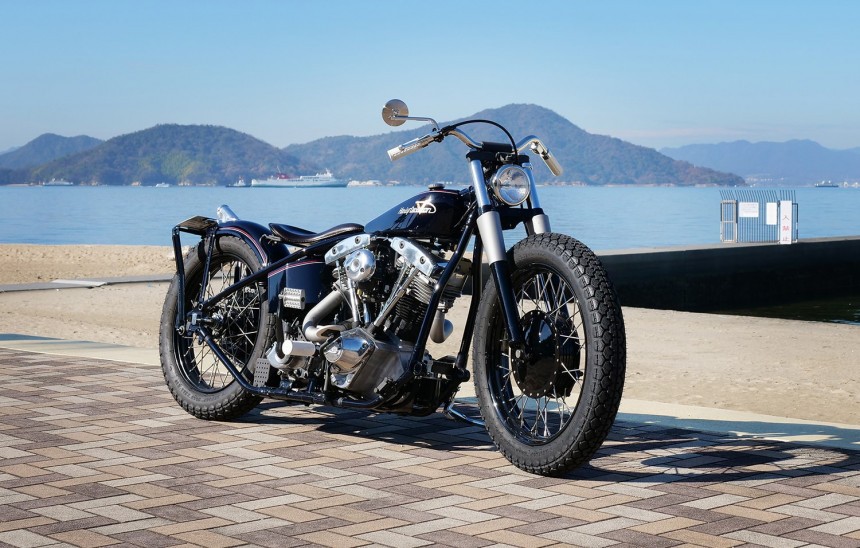Japan is home to many renowned custom bike builders whose work we love to revisit time and time again. But then you’ve got all the promising outfits which emerged on the scene more recently, like Infinity Motorcycle over in Saitama. The shop was established a few years ago by one Masumi Tsuchino, who’d previously worked with cars as a certified mechanic.
Inspired by a good friend, he decided to cross onto the realm of two wheels by founding Infinity, and this bold move seems to be paying off. He now deals with maintenance, restorations, and fully-fledged custom projects, focusing primarily on Harley-Davidson models new and old. Of course, Masumi’s one-off builds are what we’re here to talk about today, more specifically a Shovelhead-powered bobber dripping with classic charm.
The project was commissioned by a client from Hiroshima, and it all began with the Shovelhead V-twin motor and four-speed gearbox of a 1980-model FXWG. Those powertrain components are the only bits taken from the Wide Glide, though, as just about everything else was either built from scratch or sourced from top-tier aftermarket brands. For starters, you’ve got that seamless hardtail frame which oozes ‘50s vibes and looks like a million bucks.
It is a wishbone replica skeleton built like the Panhead frames of old, hailing from the specialists over at V-Twin Manufacturing in the United States. After fitting the engine and transmission inside the framework, Tsuchino-san went with an open primary drive perfectly suited to the look he was after. Gear changes will henceforth be performed via a jockey shifter, hooked up to tailor-made linkages on the left-hand side.
Then there is that breathtaking exhaust system, fabricated in-house as a high-mounted arrangement with cocktail shaker mufflers. We find a fresh air cleaner on the intake side of things, but Masumi also added a new points cover bearing the Infinity logo. He moved on to the bodywork once the engine was good to go, and this is where his fabrication skills and ingenuity were really put to the test.
First things first, he came up with a slender fuel tank to match the look of the frame, though it wouldn’t be able to hold much juice by itself. The solution came in the form of an auxiliary tank fitted right behind the primary drive, with fresh hoses linking it to the main unit and an electromagnetic pump feeding gas to the carb. In total, the bike’s fuel capacity is rated at a decent six liters (1.6 gallons).
The main tank fronts a stylish bobber saddle, upholstered in brown leather and accompanied by a pair of supporting springs at the back. In the absence of any rear suspension, these latter bits play a vital role in making the ride as smooth as possible. Beneath the seat, you’ll notice a handmade box incorporating the oil tank and some of the Harley’s electrical bits, including a modern electronic ignition system.
Finishing off the rear end is a bobber-style fender, connected to bespoke struts and topped with a circular taillight. The license plate holder is mounted atop the mudguard, as well, and then you’ve got all the tasty equipment installed at the front. Starting with the cockpit, it is occupied a chromed handlebar with white grips, minimalistic controls, and a single rear-view mirror.
A classy Motogadget Motoscope Tiny speedo is also present in a pretty unconventional location, attached to the left fork leg by way of a CNC-machined bracket. The dial itself lives right behind the top triple clamp, and that brings us to the suspension hardware used in that area. Masumi fitted a set of 39 mm (1.5-inch) forks along with custom sleeves to give them a beefier appearance.
Down low, these bad boys connect to a retro-style drum brake offering a decent amount of stopping power. The drum is laced to an aftermarket rim by way of stainless-steel spokes, and the motorcycle’s rear end features a similar setup. Both wheels are enveloped in vintage-looking Gold Seal K70 tires from Dunlop’s range.
Illuminating the way ahead is a small Bates-style headlight, but there are no turn signals to speak of at either end. An array of other cool touches are present throughout this machine, including the new kick start pedal and a drilled battery box located right behind it. Finally, a gorgeous bit of paintwork took Infinity’s conversion across the finish line, with the frame and bodywork wrapped in a dark navy-blue base.
Red and white pinstriping is present on most garments, along with groovy Harley-Davidson graphics on the gas tank. Chrome plating makes an appearance in many other areas, while the rims and drum brakes were all finished in black. Needless to say, the mastermind at Infinity Motorcycle spared absolutely no expense here, and the fruit of his labor could easily hang with the big boys of Japan’s bike-modding scene.
The project was commissioned by a client from Hiroshima, and it all began with the Shovelhead V-twin motor and four-speed gearbox of a 1980-model FXWG. Those powertrain components are the only bits taken from the Wide Glide, though, as just about everything else was either built from scratch or sourced from top-tier aftermarket brands. For starters, you’ve got that seamless hardtail frame which oozes ‘50s vibes and looks like a million bucks.
It is a wishbone replica skeleton built like the Panhead frames of old, hailing from the specialists over at V-Twin Manufacturing in the United States. After fitting the engine and transmission inside the framework, Tsuchino-san went with an open primary drive perfectly suited to the look he was after. Gear changes will henceforth be performed via a jockey shifter, hooked up to tailor-made linkages on the left-hand side.
First things first, he came up with a slender fuel tank to match the look of the frame, though it wouldn’t be able to hold much juice by itself. The solution came in the form of an auxiliary tank fitted right behind the primary drive, with fresh hoses linking it to the main unit and an electromagnetic pump feeding gas to the carb. In total, the bike’s fuel capacity is rated at a decent six liters (1.6 gallons).
The main tank fronts a stylish bobber saddle, upholstered in brown leather and accompanied by a pair of supporting springs at the back. In the absence of any rear suspension, these latter bits play a vital role in making the ride as smooth as possible. Beneath the seat, you’ll notice a handmade box incorporating the oil tank and some of the Harley’s electrical bits, including a modern electronic ignition system.
Finishing off the rear end is a bobber-style fender, connected to bespoke struts and topped with a circular taillight. The license plate holder is mounted atop the mudguard, as well, and then you’ve got all the tasty equipment installed at the front. Starting with the cockpit, it is occupied a chromed handlebar with white grips, minimalistic controls, and a single rear-view mirror.
Down low, these bad boys connect to a retro-style drum brake offering a decent amount of stopping power. The drum is laced to an aftermarket rim by way of stainless-steel spokes, and the motorcycle’s rear end features a similar setup. Both wheels are enveloped in vintage-looking Gold Seal K70 tires from Dunlop’s range.
Illuminating the way ahead is a small Bates-style headlight, but there are no turn signals to speak of at either end. An array of other cool touches are present throughout this machine, including the new kick start pedal and a drilled battery box located right behind it. Finally, a gorgeous bit of paintwork took Infinity’s conversion across the finish line, with the frame and bodywork wrapped in a dark navy-blue base.
Red and white pinstriping is present on most garments, along with groovy Harley-Davidson graphics on the gas tank. Chrome plating makes an appearance in many other areas, while the rims and drum brakes were all finished in black. Needless to say, the mastermind at Infinity Motorcycle spared absolutely no expense here, and the fruit of his labor could easily hang with the big boys of Japan’s bike-modding scene.












